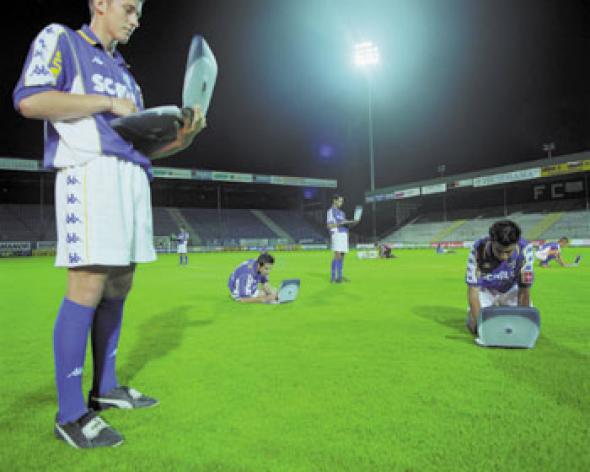Publics on Parade
In the second year of its new life, the Transmediale festival chose an ambitious thematic framework to structure workshops, screenings, club nights, panels and exhibits. Julia Schneider attended the very public offering
The transmediale.02, Berlin’s international media arts festival, has chosen ‘Go Public!’ as its motto. This gung-ho formulation acted as a foil to the conference’s more complex problematic: artistic strategies in the public sphere. Festival director Andreas Broeckmann remarked: ‘If the public sphere is under pressure in this digital age where the border between private and public data, between communication and information is disappearing, then we are interested in an active approach to that situation not only a theoretical one.’ True to its motto, this year’s festival shifted venues from the more modest Podewill to the awesomely scaled Haus der Kulturen der Welt. The transmediale was going public, for real.
On the opening night Randall Packer, Secretary of the US Department of Art and Technology, got top billing. This impressive character had come all the way form the United States. Grandiloquently he praised the power of virtualisation as the great ‘avant-avantgarde’ and described a newly democratic virtual world where ‘the beauty of that which is not real would be the most important thing, on earth.’
People became suspicious, asking whether Packer and his US Department of Art and Technology really exist. On the net they do [http://www.usdept-arttech.net], but in reality? That was of course the joke: Packer was not real, but virtual. There is no US Department of Art and Technology. Packer was a performance by TheYesMen, a group using ‘mean’ methods in order to create ‘good’ works. They are probably best known for the conference appearances they made as excessively zealous WTO delegates – an opportunity provided them by their registration of the domain name ‘www.gatt.org’ whose content is all too easily mistaken for that of the real WTO website. ‘A lot of times people listen to our speech and conform’ said Andy Bichelbaum, who represented the group at the transmediale. ‘People believe so much in the form, that the meaning becomes secondary.’
In our information-overloaded society smart work with information, advertising and PR strategies is becoming an essential part of any activity that wants to gain attention. ‘Today all parts of society work as a network and not only the net’, says Olga Goriunova at the Esc (Netsplit II), a conference organised by the Media Arts Lab at the Künstlerhaus Bethanien. ‘It seems as if everywhere the same tools and strategies are used whether in real or virtual space: all the spheres of the information society are networked together.’
In these pranksterish times, things are no longer so simple as art groups assuming corporate identities. Take, for instance, the artists/programmer Netochka Nezvanova, a cyber-age mystery entity named after a Dostoevsky character who has a penchant for spamming mailing lists. Nezvanova’s appeared as net culture’s very own enfant terrible, but what looked like a net artist was, it is now rumoured, invented to sell a commercial product. The image of an anarchist artist has become the ideal marketing tool for selling vjing software. Or is this yet another conceptual-art ruse?
The transmediale of course offered other methods for invading pubic space. For Matthew Fuller it is important to remember that ‘the public sphere is not just there, but has to be invented’. With TextFM [http://basecamp.netbase.org] he and Graham Harwood have created ‘something quite different from what those in power might have in mind.’ Their SMS to radio server is a simple, lightweight, open media system creating an incessant bubble of babbling, some kind of ‘pleasurable rubbish’. A classical bit of tactical system-warping which provides an unintended (because inclusive and democratic) use for the commercially individuating technologies.
The Chaos Computer Club is also using mobile phones as some kind of personal remote control. For Blinkenlights [http://www.blinkenlights.de] they programmed the whole Haus des Lehers on Alexanderplatz in order to produce pixaleted images on its surface at night. Via mobile phones, people can play Pong on the building or send so-called ‘Loveletters’, wonderful pixel-movies which can be created using the Blinkenpaint program. But of course this will not last forever: on the 24 February the whole show will be over, and the building will finally be renovated for big business.
Of course no one actually believes in a public take-over by the arts, not even Andreas Broeckmann. Gerrit Golke, the head of the Media Art Lab, remembers that in the early nineties ‘net art made two big promises: on the one hand, to transgress the borders between art and politics, and on the other to work towards a democratic public Internet.’ Today, when looking at an entirely changed internet, the ‘old school’ of net art sounds nostalgic when talking about the good old times when the net was thought of as a free space ready to make social utopias come true. Artists Blank & Jeron say that they mainly used new technology in order to raise questions, ‘but with flash you tend to solve problems and not ask questions.’ Alexei Shulgin meanwhile accuses the transmediale of being part of the new economy and Heath Bunting [http://www.irational.org] would quite literally like to go underground; his next project will be about ‘digging soil’. In general though it is difficult to get worried about net art not being autonomous anymore. ‘Well if that’s the case then it will be somewhere else,’ say Alexei Shulgin, ‘and one has to be sensible enough to see where things will show up next.’ Now it’s gone public, hopefully the transmediale will stay sensible as well – enough to develop further as an information and discussion pool for media arts.
Julia Gwendolyn Schneider <julia AT metamute.com> is one of Mute’s interns. She studies ‘Kulturwissenschaften’ in Berlin and is part of the Berliner Gazette’s [http://www.berlinergazette.de] editorial group
Transmediale [http://www.transmediale.de]
Mute Books Orders
For Mute Books distribution contact Anagram Books
contact@anagrambooks.com
For online purchases visit anagrambooks.com








